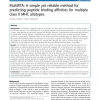Free Online Productivity Tools
i2Speak
i2Symbol
i2OCR
iTex2Img
iWeb2Print
iWeb2Shot
i2Type
iPdf2Split
iPdf2Merge
i2Bopomofo
i2Arabic
i2Style
i2Image
i2PDF
iLatex2Rtf
Sci2ools
BMCBI
2010
2010
MultiRTA: A simple yet reliable method for predicting peptide binding affinities for multiple class II MHC allotypes
Background: The binding of peptide fragments of antigens to class II MHC is a crucial step in initiating a helper T cell immune response. The identification of such peptide epitopes has potential applications in vaccine design and in better understanding autoimmune diseases and allergies. However, comprehensive experimental determination of peptide-MHC binding affinities is infeasible due to MHC diversity and the large number of possible peptide sequences. Computational methods trained on the limited experimental binding data can address this challenge. We present the MultiRTA method, an extension of our previous single-type RTA prediction method, which allows the prediction of peptide binding affinities for multiple MHC allotypes not used to train the model. Thus predictions can be made for many MHC allotypes for which experimental binding data is unavailable. Results: We fit MultiRTA models for both HLA-DR and HLA-DP using large experimental binding data sets. The performance in pre...
BMCBI 2010 | MHC Allotypes | Peptide | Predictions |
| Added | 08 Dec 2010 |
| Updated | 08 Dec 2010 |
| Type | Journal |
| Year | 2010 |
| Where | BMCBI |
| Authors | Andrew J. Bordner, Hans D. Mittelmann |
Comments (0)

